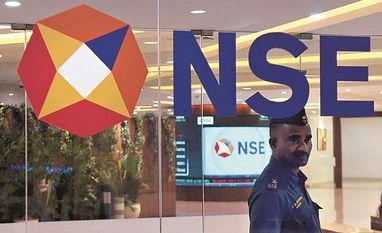Markets cheered the thrust on capital expenditure and heaved a sigh of relief at the lack of negative surprises on the tax front from the Union Budget. Shrugging off the selloff in the bond market, the equities managed to notch up nearly 1.5 per cent gain, extending its two-day up move to nearly 3 per cent.
The benchmark indices traded more than a per cent higher ahead of the Budget speech following a rally in global markets as Fed officials tried to tone down their hawkish outlook to calm the markets.
As with every Budget day trade, the domestic markets yo-yoed, with Sensex and the Nifty even slipping into the red as traders digested negative surprises around higher borrowing and lower disinvestment.
From the day’s highs to lows, the Sensex saw a movement of 1,294 points but managed to finish strong, with investors pinning hopes that the government’s growth push will boost corporate earnings and attract higher flows into equities.
The Sensex closed at 58,862, with a gain of 848 points, or 1.46 per cent — and once again turned positive on a year to date basis. Nifty, on the other hand, ended the session at 17,577, a gain of 237 points or 1.3 per cent. In the previous two weeks, both indices had plunged nearly 7 per cent amid US Fed’s hawkish pivot to tame soaring inflation.
The Union government increased the outlay for capital expenditure by 35.4 per cent from Rs 5.54 trillion in the current year to Rs 7.5 trillion in 2022-23. The increased outlay comes to about 2.9 per cent of the gross domestic product (GDP).
Analysts said the sharp rise in allocation for capital expenditure, coupled with the post-pandemic recovery, would evoke strong foreign portfolio investor (FPI) flows.
FPIs net sold shares worth just Rs 22 crore while their domestic counterparts bought shares worth nearly Rs 1,600 crore.
“The announcements will potentially kick off a capex cycle. We were expecting a 20 per cent increase in capex and the Budget allocations are massive. That’s a solid boost to the economy at a time when private sector capex hasn’t taken off. There were no anti-rich taxes, which is a big positive,” said Saurabh Mukherjea, founder and CEO, Marcellus Investment Managers.
The move to limit surcharge on long-term capital gains (LTCG) to 15 per cent for all assets was cheered by the market. Besides lack of tinkering with other capital, market-related taxes too were seen as a positive step although market participants had lobbied for some concession around buyback tax and securities transaction tax (STT).
Experts said the market liked that the government did not resort to any major populist measures during a year with key state elections. Elections are due in 2022 in more than half a dozen states, including the politically crucial Uttar Pradesh.
“With no major populist sops, the budget seems to be again putting economic growth over any political expediency — especially in light of the pending state elections,” said Prabhat Awasthi, managing director and Country head, Nomura.
“But the government hasn’t succumbed to give doles despite this being a busy election year. Barring crude playing spoilsport, the estimate for the next fiscal seems reasonable in terms of revenues or economic growth. Building infrastructure assets is better to deploy funds than populist measures to revive demand. Having said that, the Budget is not going change the market’s trajectory in a big way tomorrow onwards,” said UR Bhat, co-founder, Alphaniti Fintech.
Experts expressed concerns over the rising crude prices, as they could weigh on the macroeconomic indicators. The economic survey noted that the GDP would grow at 8.5 per cent if the crude prices remain at $70-75 per barrel. The brent crude was trading $90.90 per barrel, highest since October 2014.
“Given India’s heightened trade deficit and a strong push in borrowing, the macro risks from a global tightening cycle will be a key concern and needs to be watched carefully,” said Awasthi.
The market breadth was mixed, with 1,756 stocks advancing and 1,591 declining on BSE. More than two-thirds of Sensex stocks ended with gains. Tata Steel was the best performing Sensex stock and gained 7.5 per cent. Barring four, all sectoral indices on BSE gained. Metal stocks gained the most, its index rising 4.9 per cent.
Unlock 30+ premium stories daily hand-picked by our editors, across devices on browser and app.
Pick your 5 favourite companies, get a daily email with all news updates on them.
Full access to our intuitive epaper - clip, save, share articles from any device; newspaper archives from 2006.
Preferential invites to Business Standard events.
Curated newsletters on markets, personal finance, policy & politics, start-ups, technology, and more.
)